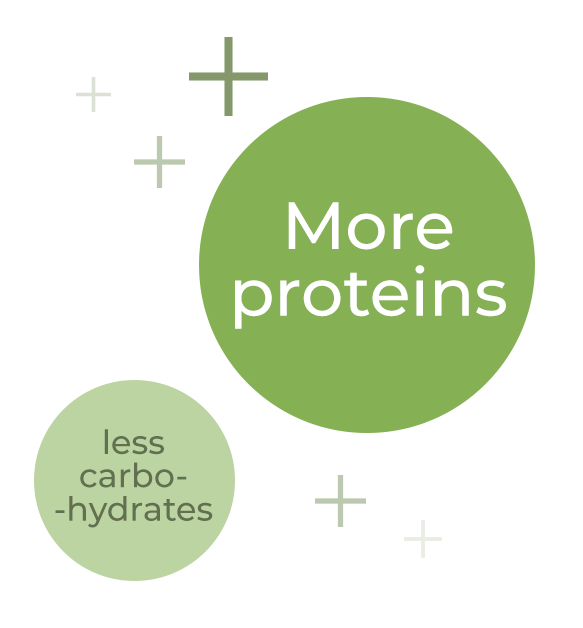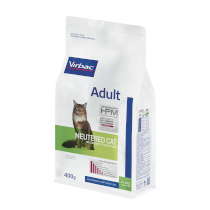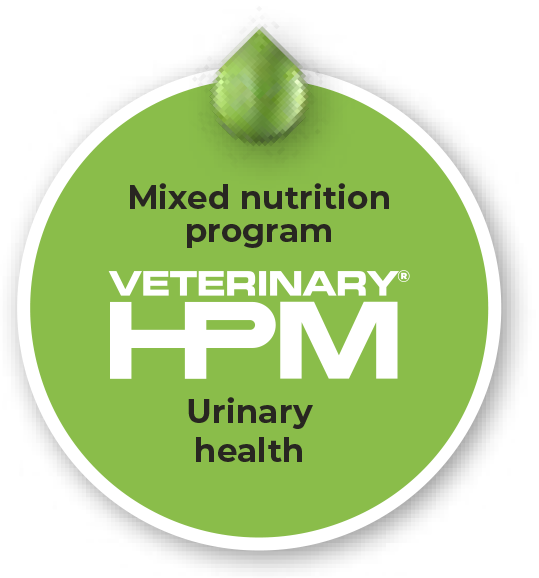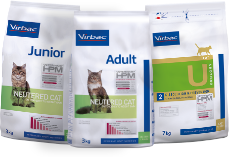
How to feed my neutered cat ?
Adult neutered cats are predisposed to two major risks: overweight and lower urinary tract disease.
Neutering induces hormonal and metabolic modifications. Energy needs decrease by 25-30% and appetite increases at the same time. If their diet is not modified, neutered cats quickly gain weight, which can alter their health, quality of life and well being. The second major risk is urinary issues, which are 2.5 to 7 times higher for neutered cats. Both are closely linked. Overweight cats drink and litter less, which can result in urinary disorders. For these reasons, it is absolutely necessary to change cats' diet when neutering them.
An adapted nutrition can make all the difference for his health
Reducing quantities is not a good solution. It can induce begging behaviour as well as nutritional deficiencies. Your cat should receive all the nutritional components essential to its health in sufficient quantities.
The solution is to adopt a diet that is specifically designed to cover neutered cats needs. Their diets need to bring fewer calories for the same quantity of food, in order to lower the energy intake and maintain the volume of ration. Calorie intake should come primarily from protein; fat and carbohydrate intake should be controlled to provide less energy. Protein is essential in helping to maintain muscle mass instead of fat mass. Protein also promotes satiety in combination with dietary fibre. This is especially important after sterilisation when your cat's appetite increases. Conversely, starch and sugars should be limited because they are a less useful source of energy for strict carnivores like your cat, and could be stored as fat if taken in too much.
Changing their diet should be done as soon as possible after neutering. It’s even better to anticipate the change and begin the transition between the old and the new diet a few days prior to neutering, in order to avoid the stress of changing diet during recovery.
VETERINARY HPM® ADULT Neutered cat: designed for neutered cat's health and pleasure
VETERINARY HPM® range is specifically designed to offer both pleasure and health for your cat.
Based on low carbohydrate / high protein concept of formulation, our neutered cats diets are very close to cats’ natural preferences. They are designed to help your neutered cat keep an optimal body condition and a healthy urinary tract. Our diets contain a high amount of animal proteins, which are essential to your cat’s health as they naturally maintain muscle mass and stabilise urine pH. Our formula contains low levels of carbohydrates which limits the risks of weight gain and fat deposit.
Our neutered cats range covers the nutritional needs of cats all along their life, from Junior to Senior age, with 5 dry diets and a new wet diet specifically designed for Adult neutered cats: VETERINARY HPM® Adult cat with salmon, chunks in gravy.
Dry range:
Wet diet:
Adult neutered cats with salmon
Chunks in gravy, single pouches for optimal freshness, packed in box of 12.
9% Vegetable ingredients - no gluten - no grain
87% Pork, poultry, salmon ingredients
Our chunks in gravy are made of high quality ingredients. Very low carbohydrate, high protein recipe respecting the needs of cats as carnivores in addition to their natural high flavour and taste, this diet will contribute to maintain your neutered cat in good health:
- Provides high hydration
- Promotes urinary health
- Improves satiety effect
More information (about VETERINARY HPM® Adult Cat with salmon, chunks in gravy)
How to feed my cat with VETERINARY HPM® ADULT Neutered Cat food?
All our diets are complete ones.
You can then use our dry diets or wet diet alone, for exclusive feeding. You can also combine our VETERINARY HPM® Adult cat wet diet with our VETERINARY HPM® adult cat dry diet. This way you will provide your neutered cat with a high quality VETERINARY HPM® mixed nutrition program. You can for example provide your cat with one pouch of chunks in gravy/day, and complete his ration with the adapted quantity of kibbles (see rations).
What else can I do to support my cat’s body condition after neutering?
The first months after sterilisation are the most important and your vigilance should be high.
Encourage your cat to exercise. Do not overfeed them and stick to the recommended daily rations. Weigh your cat regularly and see your veterinarian if you notice any weight gain.
What else can I do to support my cat’s urinary health after neutering?
 |
Fresh water in adapted bowls
|
 |
Take care of the litter box
|
 |
Avoid stress and boredom
|
 |
Take care of bodyweight
|

Because a good diet is above all a question of health, our range is available at your vet's.
The VETERINARY HPM® map allows you to find the nearest clinic in one click or you can buy online.



.png)

.png)
.png)



